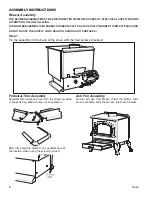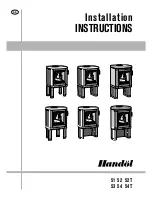
42
15.0 Supplementary Inst. Instructions UK
SUPPLEMENTARY INSTALLATION INSTRUCTIONS UK
READ THE INSTRUCTION BOOKLET AND THESE SUPPLEMENTARY INSTRUCTIONS CARE-
FULLY BEFORE INSTALLATION
These instructions together with those in the instruction booklet cover the basic principles to en-
sure the satisfactory installation of the stove, although detail may need slight modification to suit
particular local site conditions.
In all cases the installation must comply with current Building Regulations, Local Authority Bye-
laws and other specifications or regulations as they affect the installation of the stove.
It should be noted that the Building Regulations requirements may be met by adopting the rele-
vant recommendations given in British Standards BS 8303, BS EN 15287-1:2007 as an alterna-
tive means to achieve an equivalent level of performance to that obtained following the guidance
given in Approved Document J.
Please note that it is a legal requirement under England and Wales Building Regulations that the
installation of the stove is either carried out under Local Authority Building Control approval or
is installed by a Competent Person registered with a Government approved Competent Persons
Scheme. HETAS Ltd operate such a Scheme and a listing of their Registered Competent Persons
can be found on their website at www.hetas.co.uk.
CO Alarms:
Building regulations require that when ever a new or replacement fixed solid fuel or wood/bio
-
mass appliance is installed in a dwelling a carbon monoxide alarm must be fitted in the same
room as the appliance. Further guidance on the installation of the carbon monoxide alarm is
available in BS EN 50292:2002 and from the alarm manufacturer’s instructions. Provision of an
alarm must not be considered a substitute for either installing the appliance correctly or ensuring
regular servicing and maintenance of the appliance and chimney system.
The Clean Air Act 1993 and Smoke Control Areas
Under the Clean Air Act local authorities may declare the whole or part of the district of the aut-
hority to be a smoke control area. It is an offence to emit smoke from a chimney of a building,
from a furnace or from any fixed boiler if located in a designated smoke control area. It is also an
offence to acquire an ”unauthorised fuel” for use within a smoke control area unless it is used in
an ”exempt” appliance (”exempted” from the controls which generally apply in the smoke control
area). In England appliances are exempted by publication on a list by the Secretary of State in
accordance with changes made to sections 20 and 21 of the Clean Air Act 1993 by section 15 of
the Deregulation Act 2015. Similarly in Scotland appliances are exempted by publication on a list
by Scottish Ministers under section 50 of the Regulatory Reform (Scotland) Act 2014.
In Wales and Northern Ireland these are authorised by regulations made by Welsh Ministers and
by the Department of the Environment respectively.
Further information on the requirements of the Clean Air Act can be found here:
https://www.
gov.uk/smoke-control-area-rules
Your local authority is responsible for implementing the Clean Air Act 1993 including designation
and supervision of smoke control areas and you can contact them for details of Clean Air Act
requirements”
“The TT80RLS has been recommended as suitable for use in smoke control areas when
burning wood.”
HEALTH AND SAFETY PRECAUTIONS
Special care must be taken when installing the stove such that the requirements of the Health
and Safety at Work Act are met.
Handling
Adequate facilities must be available for loading, unloading and site handling.
Fire Cement
Some types of fire cement are caustic and should not be allowed to come into contact with the
skin. In case of contact wash immediately with plenty of water.
Asbestos
This stove contains no asbestos. If there is a possibility of disturbing any asbestos in the course
of installation then please seek specialist guidance and use appropriate protective equipment.
Metal Parts
When installing or servicing this stove care should be taken to avoid the possibility of personal
injury.
















































